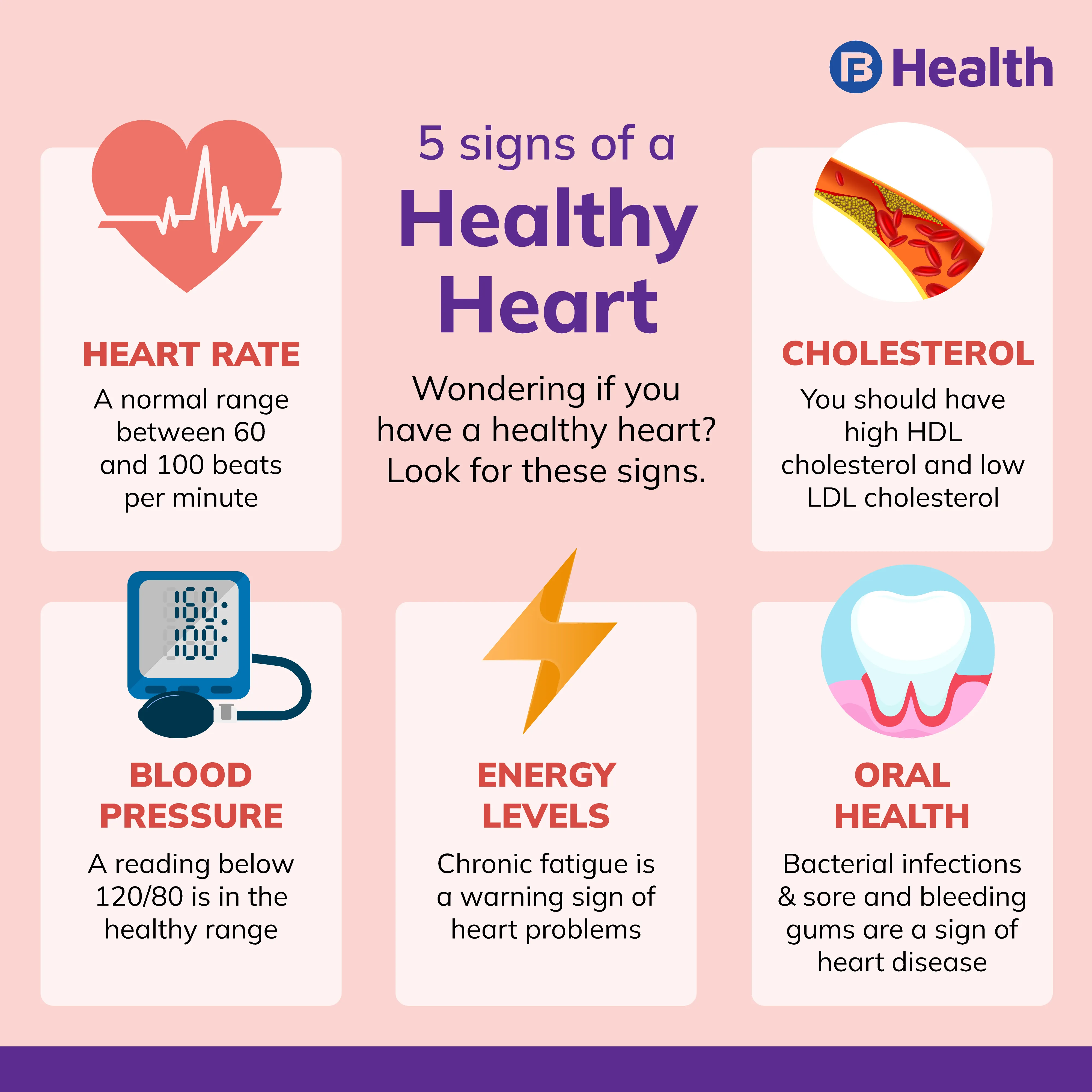Heart Health | 11 min read
Heart Murmurs: Meaning, Early Signs, and Prevention Tips
Medically reviewed by
Table of Content
Key Takeaways
- Around 30% of children and 10% of adults have mild murmurs
- Chest pain and palpitations are signs of heart murmurs in adults
- Innocent heart murmurs are harmless and don’t require treatment
Generally, the hearts make a ‘lub-dub’ sound when it beats. This is normal in a healthy heart. On the other hand, heart murmurs are unusual. These are caused by the normal turbulent or vibrant blood flow within the heart. They make whooshing or swishing sounds. Doctors can hear heart murmurs through a stethoscope. Typically, heart murmurs are of two types, which are:
- Innocent
- Abnormal
Innocent heart murmurs are harmless and common in children. Around 30% of children and 10% of adults have a mild murmur. Innocent heart murmurs are not injurious and often don't require treatment. But, an abnormal heart murmur in adults is a sign of an underlying heart condition. It points to sickness and causes other symptoms.
Read on to understand the different heart murmurs causes, symptoms, as well as a few heart murmurs prevention tips.
What is the Meaning of Heart Murmur?
The sound of blood running through the heart is called the "murmur." It can be going through a heart valve that is not normal. A health problem may cause your heart to beat faster, requiring it to process blood more quickly than usual.
The amount of blood that may flow into each of the heart's four chambers at any given time is controlled by valves that separate them. A healthy heart's valves aid in preventing blood from flowing the incorrect way.
A healthy heart beats with a "lub-dub" sound. A portion of the heart makes a "lub" (systolic sound) when it contracts, closing the mitral and tricuspid valves, and a "dub" (diastolic sound) when it relaxes, closing the aortic and pulmonic valves.
A lot of healthy children can develop heart murmurs, but they may outgrow them as adults. These could also take place when pregnant. These heart murmurs are referred to as "innocent" murmurs and are not abnormal heart sounds. They don't require therapy or a change in lifestyle because they aren't associated with illnesses or heart problems.
Yet there are few outliers. For example, a broken or overworked cardiac valve may cause heart murmurs. Some people have valve issues from birth. Others develop them as they age or due to other heart issues.

Different Types of Heart Murmur
Heart murmurs are divided into groups according to when they occur during a heartbeat. Different types of heart murmurs are:
Systolic:
When your heart muscle contracts, you may experience this type of murmur (tightens)
Diastolic:
When your heart muscle relaxes, you may hear a murmur
Continuous:
As your heart muscle is contracting or relaxing, you may hear a continuous heart murmur
Continuous and diastolic murmurs are more frequently associated with heart disease. Yet, every cardiac murmur needs to be examined.
What Causes Heart Murmurs?
The turbulent or aberrant blood flow across your heart valves causes a murmur. In addition, a heart ailment or another disorder brings on certain heart murmurs. Frequent heart murmur causes are:
Anaemia
Low red blood cell count, or anemia, lowers blood viscosity and can result in a murmur (thickness). In addition, anemia can cause weakness and exhaustion (extreme tiredness).
Carcinoid Heart Disease
A slow-growing tumour (cancer) called carcinoid syndrome or carcinoid heart disease is brought on by too many hormones and can have an impact on your heart. Other symptoms of carcinoid syndrome include unexplained weight loss, abdominal pain, diarrhoea, and low blood pressure.
Congenital Heart Defect
You may have a structural issue with your heart since birth. Tetra logy of F allot and a septal defect, which is a hole in your heart, are two examples of congenital heart defects.
Endocarditis
A heart infection is called endocarditis. Once in the bloodstream, bacteria or other organisms attack the heart valves. Other symptoms, including fever, chills, rash, or sore throat, are typically present.
Heart Valve Disease
Heart valve disease results from one or more heart valves that aren't functioning properly, which interferes with healthy blood flow. For instance, a valve can be rigid (valve stenosis). As a result, it might not be fully open or closed. A blood leak in the wrong direction could also result from it (valve regurgitation). Additional symptoms include ankle or foot swelling, heart palpitations (fluttering), shortness of breath, or chest discomfort.
Hyperthyroid
Hyperthyroidism produces an excessive amount of thyroid hormone. Moreover, the illness may result in anxiety, a heightened appetite, a quick heartbeat, and weight loss.
Hypertrophic Cardiomyopathy
Hypertrophic cardiomyopathy enlarges, thickens, or stiffens the heart muscle. It may develop due to ageing or excessive blood pressure, or it may be inherited. Syncope (fainting), chest pain, heart palpitations, exhaustion, and shortness of breath are some more symptoms that could exist.
Innocent Heart Murmurs Causes
Innocent heart murmurs may occur if blood is moving more quickly than usual (also called normal or physiologic). Occasionally, they are referred to as "functional" or "physiologic" murmurs. This kind of murmur is frequent during the following:
- Childhood
- The first few days after a baby's birt
- Fever
- Pregnancy
- Exercise or physical activity
- Adolescence or phases of rapid growth
- Hyperthyroidism or high thyroid hormone in your body
- Anemia or low red blood cells to carry adequate oxygen to your body tissues
- Abnormal heart murmurs
Heart murmur sounds that are innocent can vanish and resurface. When your heart beats more quickly, it can become louder. Many of them eventually disappear, but some endure forever. Innocent heart murmurs do not indicate heart problems.
Which Medical Conditions Have Heart Murmur Symptoms?
Heart Valve Disease
Heart valve disease is brought on by a structural flaw in the heart. This condition can be inherited or developed over time.
Patent Ductus Arteriosus
When the opening between the aorta and the pulmonary artery does not properly shut after birth, it is said to have a patent ductus arteriosus.
Age
As we get older, calcium can accumulate in our heart valves. As a result, the valves open less widely, which makes it more difficult for blood to pass through.
Aortic Valve Defects
The aortic valve can occasionally enlarge or strain and stop functioning properly. A cardiac murmur results from the blood leaking backwards as a result of this. Aortic regurgitation is the medical term for this ailment.
Infective Endocarditis
A bacterial infection of the heart's lining could harm the heart's valves. The valves' openings will get smaller due to bacterial growth, impacting how well blood flows through them.
Chronic Rheumatic Heart Disease
Individuals who have chronic rheumatic heart disease experience persistent inflammation in their heart valves, which impairs their ability to function and, as a result, the flow of blood through them.
Tumours
A heart valve can develop tumours as well. In addition, by altering the blood flow through the heart, tumours in other areas of the organ, such as the left atrium, might result in a heart murmur.
Septal Defects
Arterial and ventricular septal abnormalities result in holes in the walls separating the upper and lower chambers.
The following circumstances also contribute to heart murmurs:
- Degenerative valve disease
- Hypertrophic obstructive cardiomyopathy
- Left ventricular outflow tract obstruction
- Rheumatic fever
- Mitral valve prolapses
- Turner syndrome
- Ehlers–Danlos syndrome
- Marfan syndrome
- Noonan syndrome
- Congenital rubella syndrome
- Systemic lupus erythematosus
- Ebstein's anomaly

Symptoms in Adults
People with an innocent heart murmur may not show any signs or symptoms. But, if you have an abnormal heart murmur, you could experience symptoms. This will vary based on the cause. Here is a list of the symptoms.
- Chest pain
- Dizziness
- Fainting
- Swelling of the body
- Sudden weight gain
- Shortness of breath
- Chronic cough
- Fatigue
- Enlarged liver
- Enlarged neck veins
- Palpitations (rapid heartbeats)
- Swelling in the legs or abdomen
- Heavy sweating without any activity
- Poor appetite, excessive fussiness, and breathing difficulties in infants
- Change of skin colour to blue (bluish skin), especially on lips and fingertips
Can New Born Babies Have Heart Murmur?
Pediatricians who listen to a baby's heartbeat occasionally report hearing an extra or strange sound in between beats.
A heart murmur meaning is an additional sound that can be heard as blood flows through the heart in between heartbeats. It is frequently an "innocent" heartbeat in infants and is not a cause for alarm. Yet occasionally, it can be a sign of a hidden cardiac issue. Although, less than 1% of the general population has abnormal heart murmurs, which are uncommon, especially in infants.
As babies transition from breathing on their own to receiving their mother's oxygen via the placenta, cardiac murmurs may occur. During this time, blood circulation changes could happen. In the following situations, doctors will detect innocent heart murmur symptoms in children:
- Vascular narrowing, which can happen when vessels stretch during times of rapid growth, like throughout adolescence
- Lung expansion after birth
- Increased turbulent flow, which occurs in high cardiac output situations like anaemia
Infants, adolescents, and adults frequently have harmless heart murmurs, sometimes called innocent heart murmurs. While greater activity or temperature causes the heart to pump more blood, they are typically louder when a person is aroused, has a fever, or is sick. These heart murmurs develop in a heart with structural normality and don't call for any restrictions on daily activities or other safety measures.
How is Heart Murmur Diagnosed?
Your doctor may make an initial diagnosis by listening to your heart with a stethoscope. Sometimes they also check for any abnormal breathing patterns or changes in skin colour. Doctors conduct other tests too. For example, physical examination and tests will help your doctor diagnose the cause of your heart murmur. Some may even assess your blood pressure and pulse rate. To detect whether your heart murmur is innocent or abnormal, doctors may order a battery of tests. Common tests include:
Chest X-ray
To identify any structural issues, a chest X-ray takes images inside your chest.
Echocardiogram
An echocardiogram, or what is commonly known as an echo, uses sound waves to produce images of the chambers and valves of your heart. It aids in examining the pumping motion of your heart. This can be done through your mouth and esophagus using a more advanced ultrasound technique that produces better images than a surface ultrasound.
Electrocardiogram
An electrocardiogram, commonly known as an ECG or EKG, is a painless diagnostic that evaluates your heart's electrical activity.
These will determine if you have an innocent or abnormal heart murmur. If your heart murmur is linked with heart problems, your next step is to visit a heart specialist or cardiologist. Medications or surgery may be prescribed to treat heart murmurs.
Heart Murmur Treatment
Most innocent heart murmurs don't require medical attention. For example, when a fever or hyperactive thyroid (hyperthyroidism) is treated, a murmur that was brought on by those conditions usually stops.
The reason for a troubling heart murmur determines the course of treatment. A healthcare professional must closely monitor a heart murmur that is concerning. Surgery or medication may be required.
Medications
The following medicines could be used to treat heart problems linked to murmurs:
Blood Thinners or Anticoagulants
This kind of medication works to stop blood clots. Heart arrhythmias, which can result in blood clots, are intimately related to some illnesses that produce heart murmurs. In addition, the risk of strokes is increased by blood clots. Warfarin (Jantoven), clopidogrel (Plavix), apixaban (Eliquis), rivaroxaban (Xarelto), dabigatran (Pradaxa), and other blood thinners are available.
Water Tablets (Diuretics)
This medication helps the body get rid of extra fluid. High blood pressure and other types of disorders that can exacerbate heart murmurs may be treated with a diuretic.
Angiotensin-Converting Enzyme (ACE) Inhibitors
Drugs of this kind reduce blood pressure. Heart murmurs are brought on by underlying disorders, which high blood pressure might make worse.
Beta Blockers
A beta blocker reduces blood pressure and heart rate.
Before surgery or dental operations, many patients with alarming heart murmurs were advised to take antibiotics to avoid certain heart infections.
That advice has been modified. The use of antibiotics is only advised under certain circumstances.
Those with artificial heart valves, a history of heart valve infections, or congenital heart defects that enhance the risk of infection inside the heart may be advised.
Surgery and Other Procedures
Surgery can be required to treat a disorder that results in a concerning heart murmur.
For instance, heart valve repair or replacement may be required if the murmur and associated symptoms are brought on by a constricted or leaking heart valve.
During the repair of a heart valve, a surgeon might:
- Repair holes inside the valves
- Separate fused valve leaflets
- Replace supporting chords of the valve
- Trim any extra valve tissue to enable the valve to seal tightly
- Reinforce or tighten the ring around a valve
- The procedure for heart valve surgery is as follows:
- An open heart surgery
- A minimally invasive cardiac operation
- Robotic cardiac surgery
- A procedure involving flexible tubing (catheter procedure)
- The particular heart disease determines how the surgery or procedure is carried out.
Innocent heart murmurs usually do not require any treatment or further testing. However, for abnormal heart murmurs, your doctor may prescribe treatment. These generally treat the cause. For instance, doctors may prescribe medicines to prevent blood clots, control irregular heartbeat or palpitations, and lower blood pressure. Drugs such as diuretics [4] are prescribed to get rid of excess salt and water from your body. This makes it easier for your heart to pump. In some cases, surgery may be required to correct heart defects. These may exist from birth or be caused due to heart valve disease.
Additional Read: Yoga for Heart HealthPrevention
Heart murmurs are not a disease and are often harmless. You can’t prevent heart murmurs in most cases. But, doctors will treat underlying conditions such as high blood pressure or heart valve infection to prevent heart murmurs. In children, heart murmurs fade as they grow. For adults, improvements in the underlying causes can make the murmurs go away.
Additional Read: Tips to Maintain a Healthy HeartIf you experience indications of heart murmurs in the form of chest pain, breathlessness, or palpitations, consult your heart health care provider. To get advice on healthy lifestyle practices, book an online doctor consultation on Bajaj Finserv Health. Start following recommendations by heart specialists and keep heart murmurs at bay.
References
- https://www.heart.org/en/health-topics/heart-murmurs
- https://www.health.harvard.edu/a_to_z/heart-murmur-a-to-z
- https://www.cdc.gov/groupastrep/diseases-public/rheumatic-fever.html#:~:text=Rheumatic%20fever%20(acute%20rheumatic%20fever,key%20to%20preventing%20rheumatic%20fever.
- https://my.clevelandclinic.org/health/treatments/21826-diuretics#:~:text=Diuretics%2C%20or%20water%20pills%2C%20help,failure%20or%20other%20medical%20problems.
Disclaimer
Please note that this article is solely meant for informational purposes and Bajaj Finserv Health Limited (“BFHL”) does not shoulder any responsibility of the views/advice/information expressed/given by the writer/reviewer/originator. This article should not be considered as a substitute for any medical advice, diagnosis or treatment. Always consult with your trusted physician/qualified healthcare professional to evaluate your medical condition. The above article has been reviewed by a qualified doctor and BFHL is not responsible for any damages for any information or services provided by any third party.





